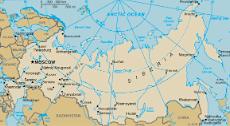Fertile fields where there was once barren tundra; the Arctic free of ice; unhindered access to mineral resources -- in Russia, there is increasing hope that the country will emerge as a winner from the catastrophe of climate change. For the northern giant with millions of cubic kilometers of permafrost soil, global warming could bring enormous national benefit. The other countries around the North Pole are likewise beginning to imagine the coming of a new Golden Age. On this view, a Union of Nordic Nations might be the strategic alliance of the future, which thanks to the warming climate could keep pace with China and India in global competition. In light of melting icebergs and glaciers and the expected rising of the coastal sea level, in light of droughts, devastating hurricanes, and other destructive weather phenomena, global climate change has become a political theme even in the United States, and many commentators are demanding still stricter emission targets than those contained in the Kyoto Protocol. But in Russia other voices are making themselves heard. Thus, for example, Georgi Grusa, one of Russia's leading climatologists, believes that even just "a medium term prognosis on climactic trends is not possible, because it is completely unclear how the factors will behave that influence climate change." Predictions concerning key factors like volcanic eruptions and solar activity are hardly possible. According to Yuri Golubchikov of the Geography Department at Moscow State University, the connection between human-induced carbon dioxide emissions and global warming is anything but proven. He believes the primary cause for warming is to be found rather in the periodic oscillation of ocean temperatures. "The upper levels of the ocean contain 57 to 60 times more carbon dioxide than the air," Golubchikov calculates, "If the temperature of the ocean rises a little, gigantic amounts of carbon dioxide are released into the atmosphere through the evaporation of water. The total volume of this release and absorption of carbon dioxide is five times higher than the industrial emission of carbon dioxide."
<<ad>>
It is undisputed that Russia, the Earth's largest country, has a key role to play in the battle against greenhouse gases. It was only when the Russian parliament -- in contrast to the United States -- ratified the Kyoto Protocol on Nov. 18, 2004, that the treaty to reduce the emission of greenhouse gases could come into effect. The Protocol requires that Russia's greenhouse gas emissions be reduced by some 17.4 percent by 2012, as compared to 1990 levels. Since the collapse of the Soviet Union already brought with it an emissions reduction of some 30 percent, Russia is in the comfortable position of not having to place any particular restrictions on its currently booming economy. According to the estimate of the German Institute for Economic Research, the country could, moreover, earn up to $20 billion through the sale of emission rights.
A New Golden Age: Russia Looks Forward to Global Warming

